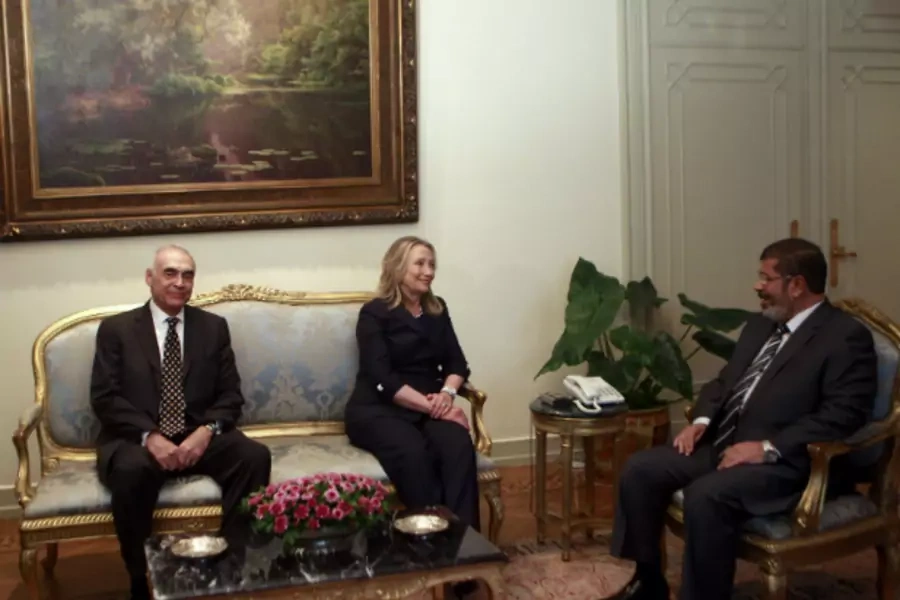More on:
Longtime observers of Secretary of State Hillary Clinton—both friendly and unfriendly—will attest to her intelligence, sense of humor, and unfailing grace. So it was a few weeks ago upon her arrival in Israel that she said she was not offended by the way she was received during her visit to Egypt on July 14 and 15, saying that she only regretted “the wasted tomatoes.” The secretary of state was, of course, referring to the tomatoes that some Egyptians used to rain down on her motorcade when she arrived in Alexandria to open the new consulate in Egypt’s second city. Clinton’s quip deflected what was decidedly not an exemplar of Egyptians’ famous hospitality and downplayed the secretary’s curious visit to Egypt.
Arriving in Egypt during Clinton’s visit was like being transported into an alternate universe where reason and logic were either suspended or turned on their head. Everywhere I went, everyone with whom I spoke—with some notable exceptions—wanted to know why the United States, and specifically the secretary of state, supported the Muslim Brotherhood. Huh? To be sure, this may have been a function of the way my schedule shook out as my first 24 hours were taken up with various coffees, meals, and meetings with felool, Copts, so-called liberals, and business honchos. It was clear to them that Ahmed Shafiq had won the second round of the presidential election, but the chicanery of the Brothers together with the complicity of the United States and the weakness of the Supreme Council of the Armed Forces (SCAF) conspired to make Mohamed Morsy the first civilian and Islamist president of Egypt.
It wasn’t just the outcome of the presidential election that fueled these suspicions, Morsy’s election capped a narrative about Washington’s alleged interest in the accumulation of Brotherhood power in Egypt. Why, my interlocutors asked, had Washington reached out to the Brotherhood a few months after Mubarak fell? It was apparently part of a plan. I had heard this kind of thing before during the height of the George W. Bush’s “Freedom Agenda” when Egyptian officials asked why the United States sought to change the “character of the regime” in favor of the Brothers.
Secretary Clinton’s statement to the effect that Washington would like to see a “full transition to civilian rule,” the emergence of democratic institutions, and the military’s return to a “purely national security role” was further evidence that the United States, after three decades of quietly supporting President Hosni Mubarak’s repression of the Brothers (as well as a variety of other groups both rather nasty and benign), had flipped. Clinton’s statement was about the importance of democratic governance without endorsing any one group in particular, but her critics seized on it as an affront to them and the armed forces, which is now regarded, a la once upon a time in Turkey, as the guarantor against further Islamization of politics and society. This is not to suggest that these groups, especially the Copts whose leaders refused to meet with Secretary Clinton, have nothing to fear from the Muslim Brotherhood, but the implication that the United States has actively abetted the rise of the Brotherhood since Mubarak’s fall does not conform to reality. There are, indeed, few places where the interests of the Muslim Brotherhood and Washington overlap. As I wrote in late June, it is unlikely that there will be a breach in U.S.-Egypt relations, but the relationship is bound to be more complicated than it was under Mubarak. Incidentally, this is not a function of “Islamist politics,” but rather politics in Egypt’s relatively more open society.
The only respite from the “Hillary ♥ the MB” was my encounter with members of the Brotherhood’s Freedom and Justice Party who asked me why the United States, especially the secretary of state, supports the SCAF. The Brothers actually have a stronger case for distrusting Washington given its generous financial support to the Egyptian Armed Forces since the early 1980s. Still, the whole experience, while not entirely unexpected, bordered on the absurd.
Secretary Clinton’s chilly reception in Egypt—she also confronted nasty protesters at her Cairo hotel—leads one to wonder why she went in the first place. To be fair to Clinton’s team, it is hard to know when protests are going to break out and hindsight is 20-20, but it was not all that difficult to understand that there were some serious downsides to her visit. Were the messages that the secretary carried about the importance of a democratic transition, the value of bilateral ties, and the significance that Washington attaches to the Egypt-Israel peace treaty worth the trouble? Well before Mubarak’s fall, the United States had become a significant and negative factor in Egypt’s domestic politics. Add to this sentiment the fact that the January 25th uprising was about national empowerment and dignity, and observers can understand why trust and goodwill toward the United States are in short supply in Egypt. As a result, the secretary’s meetings with Egypt’s new president and Field Marshal Tantawi, but not with the opposition, were bound to run into a buzzsaw of conspiracy mongering and hostility. The whole episode had the effect of adding uncertainty to an already murky and tension-filled political environment.
I hope Clinton’s visit achieved its desired goals, but had policymakers had a better appreciation of how the dynamics of the U.S.-Egypt relationship play out in Egyptian domestic politics, they may have left it to Deputy Secretary of State William Burns—who visited Egypt a few weeks before Clinton—to be the bearer of the various messages Washington wanted to send Cairo. I understand the symbolic difference between a visit from the American Secretary of State and her number two and I am not saying that the visit was not paved with good intentions, but outside the Ministry of Defense and the presidential palace it looked like precisely the opposite.
More on:
 Online Store
Online Store
